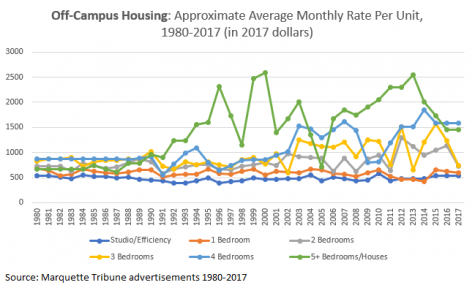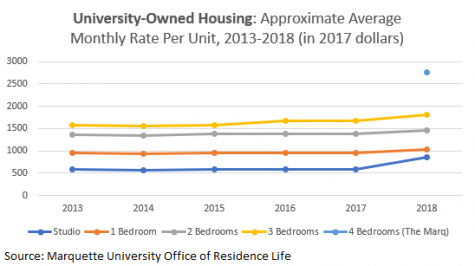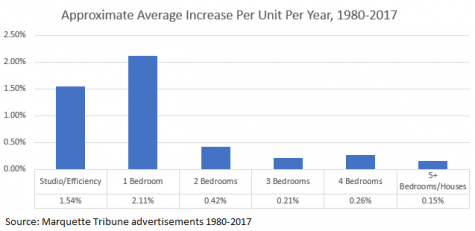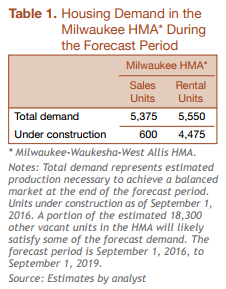Milwaukee rent is up about 2 percent from last year, according to a Department of Housing and Urban Development study. However, it’s difficult to determine if this trend will hold true for the Marquette area.
“Marquette, from an economic standpoint, is kind of its own world — its own island,” Andy Hunt, the director of the Center for Real Estate in the College of Business Administration, said. “(Rent) is hard to predict.”
He said landlords in the area know that demand is consistent every year, especially since Marquette has regularly accepted around 2,000 applicants per graduating class for the past decade, according to an Office of Institutional Research and Analysis report.
“Marquette’s campus is really insulated in a lot of ways,” Hunt said. “The demand is constant every year. You’re always going to have new students coming in. There’s always going to be about 8,000 undergrads, 4,000 of those living off-campus.”
Back in 1981, a student could have gotten a studio apartment for as low as $175 per month. That number in 2017 dollars is around $490, which falls in line with today’s prices for the same type of unit, according to off-campus apartment rentals listed in Marquette Tribune ads from 1980 and 2017.
University-owned apartment rates have remained fairly consistent since 2013. This year’s rate for a Campus Town East studio is $720, and next year it will be $755.
There were a few years where university-owned apartment rates didn’t change at all, even though inflation increased at the standard rate, about 2 percent per year, according to the Bureau of Labor Statistics.


Hunt said Milwaukee is currently experiencing an “apartment boom” where demand is outpacing supply, leading to more complexes being built. This may have an effect on the Marquette area since new complexes, like Modern Living on 15th Street, are slowly coming to fruition.
The demand for more apartment space for the general population has increased and will continue to follow that trend for at least the next three years, according to the 2017 study by the Department of Housing and Urban Development.
Over 4,000 units are currently under construction in Milwaukee, and the completion of those units will satisfy much of that demand, the study found. But it won’t be enough for the estimated 5,550 units needed to completely fulfill housing demands in Milwaukee.


This “apartment boom” may not be good for Marquette campus landlords, who are trying to keep up with newly-built complexes that offer more updated features and amenities to potential tenants. The freshness of new buildings may lead landlords around the area to lower their rates so they can stay on a level playing field with the competition, Larry Conjar, a local landlord, said.
Conjar, who has been the landlord of the Marquette I and II complexes located on 16th and 17th Streets for decades, said too many apartments are being built around campus. That leads to a high number of vacancies, especially during the summer, when few students are on campus.
He said he and other landlords in the area depend on Marquette to keep up its enrollment rates and encourage students to stay in the area during the summer semester.
Conjar suggested that too much supply and not enough demand leads landlords to face the question of raising or lowering rent. While lowering rent would reduce vacancies, raising rent would cover losses more easily. This issue is often what seems to make future rental trends unsteady and difficult to predict.
“Right now (Marquette campus) is overbuilt,” Conjar said. “A lot of people, including myself, are suffering from vacancies for next June. They’re actually lowering the rates to fill up the units.”
Anna Bednarczyk, a senior in the College of Health Sciences, said paying more for rent may be beneficial for students to improve their quality of life. She and her two roommates pay $670 a month for rent, not including utilities.
Bednarczyk, who lives in the Kensington, an off-campus apartment, said she doesn’t mind paying more for what her landlord does to keep the building in shape. She said he “gets things done.”
Bednarczyk also mentioned that she’s renewing her lease for next year, and her rate will stay the same because the landlord is still working on building improvements.
“I think I pay a little bit more than the average (student),” Bednarczyk said. “I think it’s worth it because some of my friends were saying that when they need things fixed, their landlord won’t pay for it, or they won’t fix it.”
